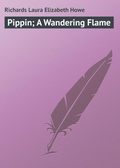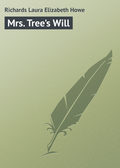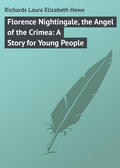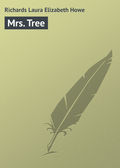
Laura Richards
Three Minute Stories
THE SWING
Hey, the old swing!
And ho! the old swing!
And hey, the old swing in the orchard!
It groans and it creaks,
It squawks and it squeaks,
You’d think ’twas most cruelly tortured.
Hey! the old swing,
And ho! the old swing,
All under the apple trees swaying:
“Oh dear! how they shake me!
They surely will break me!”
It seems to be constantly saying.
Hey! the old swing,
And ho! the old swing;
For all its lamenting and sighing,
Just give it a push,
And it’s off with a rush,
Up into the apple-boughs flying.
Hey! the old swing,
And ho! the old swing;
It’s off and away with a will now;
Old swing, stop your moaning,
Your dreary o-honing!
I’m sure you’re enjoying it still, now!
THE TREES
“Summer is gone!” said the Trees. “The fall of the year is come, and it is time for us to dress up and be gay.”
“I shall wear red!” said a Maple. “Sunset red is my color.”
“Yellow for me!” said another. “My dress shall be like pure gold.”
“I choose purple!” said the Ash. “It is the color of Kings, and suits me very well.”
“What will you wear?” they all said to the little Fir.
“I have no other dress!” said the Fir sadly. “I must wear my plain green frock.”
“Te hee!” laughed the Maples and Birches and Ash trees, rustling their leaves and nodding their heads. “She has but one dress! What a poor thing she is!”
But the old Pine waved his dark branches and said: “Hush! hush! I know what I know!”
“We know, too,” cried the Maples. “We know that in snow-time Santa Claus comes, and chooses the finest tree, and dresses it in gold and silver and hangs stars all over it. That is why we wish to be fine and gay.”
“Hush! hush!” said the old Pine. “I know what I know.”
So the trees put on their gay robes, gold and red and purple, and each one was finer than the rest; only the little Fir and the great old Pine stayed just as they were, in their plain green dresses.
Now it grew cold, and a bleak wind blew through the forest. The trees shivered and drew their bright robes close around them. Colder still it grew, and snow fell, and the wind moaned; one day Jack Frost came in his silver coat and touched the bright leaves with his shining brush, and they curled up and turned brown, and, one by one, fell rustling to the ground. Soon the poor Maples and Birches and the purple Ash who thought he looked like a King stood all bare, and the wind blew through their branches, and they shook with the cold. They looked at the Fir and wished that they had her warm, green dress. Now came Santa Claus, driving his reindeer team through the forest, cracking his whip and jingling his bells. He looked at the trees with his bright eyes.
“Ho! ho!” he said as he saw the Maples and Birches. “What a beggarly set! Why, they have not a cloak among them to keep them warm. These will never do for me.”
But now he saw the little Fir, and a smile came over his face.
“This is the tree for me!” he cried. “Will you come with me, little Fir, and be the children’s tree, and make many hearts glad?”
“That I will!” said the little Fir gladly.
So Santa Claus took her away and dressed her in gold and silver and hung bright stars all over her; and she became the Christmas Tree, and many hearts were glad because of her.
“Hush! hush!” said the old Pine. “I knew what I knew.”
THE LEPRECHAUN
“Come tell, Uncle Shaun,” says Rafferty’s Pat,
“On Patrick’s Day what would they be at
In Ireland, in Ireland,
In Ireland o’er the say?
Would they have the procession, as we do here,
Banners and shamrocks far and near,
Or would they do annything annyways queer,
In Ireland o’er the say?”
“Musha now! wisha now! mind what ye’re at!
Lind me the ears of ye, Rafferty’s Pat!
In Ireland, in Ireland,
In Ireland o’er the say,
One thing on St. Patrick’s Day does be,
If a boy should be havin’ the luck to see,
He’s safe to climb to the top of the tree,
In Ireland o’er the say.
“For my ould grandmother told me so,
And wisha! but she was the one to know,
In Ireland, in Ireland,
In Ireland o’er the say.
‘To make your fortune now, Nelligan’s Shaun,
There’s just one place where you must be gaun,
And that’s to the dance of the Leprechaun,
In Ireland o’er the say.
“‘The Leprechaun’s the height o’ me thumb;
He’s sharp as a pin and complate as a crumb;
In Ireland, in Ireland,
In Ireland o’er the say,
On Patrick’s Night he be givin’ a dance,
And oh! it’s the boy would be havin’ the chance
Could he hold him still wid the stren’th of his glance,
In Ireland o’er the say.
“‘He be askin’ all manner of beastie and bird,
And faix! they be comin’, I give ye me word;
In Ireland, in Ireland,
In Ireland o’er the say,
The rabbit would come wid his new shillelagh,
The fox and the goat would be footin’ it gaily,
The squirrel be there wid his bush for a taily,
In Ireland o’er the say.
“‘The pig brought the music, and he for to play
On a fine concertina’ (my grandmother say),
‘In Ireland, in Ireland,
In Ireland o’er the say,
Himself would be dancin’ to bate all the rest,
For all the world knows how the pig do be blest
Wid St. Patrick, long life to him, likin’ him best,
In Ireland o’er the say.
“‘The Leprechaun he be judge of the dance,
And while he be watchin’ it, then is your chance,
In Ireland, in Ireland,
In Ireland o’er the say;
For fix him once wid the stren’th of your eye,
Ye can hold him there till he’s like to die,
And he’ll give ye gold for your life’s supply,
In Ireland o’er the say.’”
“And oh! Uncle Shaun,” says Rafferty’s Pat,
“And did ye be goin’ there? tell about that,
In Ireland, in Ireland,
In Ireland o’er the say!”
“Musha now! wisha now! sure but I tried,
And I lay all night on the cold hill-side,
But ’twas only mesilf that was like to have died,
In Ireland o’er the say.
“But mind what I’m tellin’ ye, Rafferty’s Pat!
Ye’d always be thinkin’ of what ye were at,
In Ireland, in Ireland,
In Ireland by the say.
And on Patrick’s Night if ye hear the pig play,
Or meet wid a rabbit a-dancin’ so gay,
Sure the Leprechaun is not far away,
In Ireland o’er the say.”
THE DEER AND THE CROW
(Adapted)
Once upon a time in a deep wood lived a Deer and a Crow, who were great friends and loved each other dearly. One day, as the Deer was roaming about alone, he met Small-Wit, the Jackal.
Small-Wit was hungry, and when he saw the fine fat Deer he said to himself: “Oho! if only I could have this fat Deer for my supper!” So he went up to the Deer, hanging his head and looking very sad.
“Who are you, Friend?” asked the Deer, “and why do you look so sad?”
“My name is Small-Wit,” said the Jackal; “and I am sad because I have not a friend in the world. Ah! if I could win your friendship how happy I should be!”
“Very well,” said the Deer, who was very good-natured. “Come with me, and we will be friends.”
He led the way to his home, and the Jackal followed him. As they drew near, Sharp-Sense, the Crow, called from the tree where he was perching: “Who is this number two, Friend Deer?”
“It is Small-Wit, the Jackal,” said the Deer. “He is lonely, and wishes to be our friend.”
“Friendship with stranger,
Friendship with danger!”
said the Crow.
“Nay!” said the Deer. “I like this rhyme better:
“Foe is friend, and friend is foe,
As our actions make them so.”
“Very good,” said Sharp-Sense: “as you will.”
Next morning they went off hunting, and the Jackal said to the Deer: “I know a field of sweet corn, and I will take you there.”
So the Deer followed Small-Wit, and, sure enough, they came to a field of sweet young corn.
“You are a friend indeed!” cried the Deer, and he feasted till suddenly he fell into a snare which the farmer had laid.
“Alas!” cried the Deer, “Friend Small-Wit, here am I caught by the feet, and cannot move. Come, I pray you, and gnaw these cords with your sharp teeth and set me free!”
The Jackal came and looked at the snare. “That will hold you fast enough,” he said. “To-day is a fast day, but to-morrow I will have a fine feast on your fat carcass, my foolish friend.” And off he went.
Presently came along Sharp-Sense, the Crow, who had been looking for his friend. “Alas!” he cried, “how did this happen, Friend Deer?”
“Through not minding what you said,” replied the Deer.
“Well,” said the Crow, “we must do what we can. Here comes the farmer. Do you lie still and pretend to be dead until I croak: then spring up and be off.”
The farmer came along and saw our friend lying perfectly still. “Aha!” he cried, “this fellow will eat no more of my corn.”
He stooped down and untied the cords of the snare, meaning to carry off the dead Deer; but at that moment the Crow gave a loud “Caw!” Up sprang the Deer and in a moment was safe in the forest. The farmer flung a club after him; it hit Small-Wit, the Jackal, who was lurking near by hoping to have a share of the spoil, and killed him; and the two friends went home happy.
LITTLE GOLDSTAR
(Adapted)
In a southern garden lived a family of green lizards, under the roots of a palm-tree. They were merry little creatures, and their parents loved them dearly.
One day Father Lizard said to his children: “Your mother and I must go away this morning; now be good children; stay close together, and be sure that one of you keeps watch for fear of snakes and hawks!”
The little lizards promised; and for some time they were very careful; first one kept watch, and then another; but at length Sprightly said: “There is no danger near. Why should we not all play together, just for a little while?”
Oh dear! they forgot their promise, and see what came of it! While they were playing merrily, a great snake glided quietly out from the grass, seized poor Sprightly, and carried her off to his den.
The other lizards fled in terror. Swiftfoot ran up the tree, Longtail hid in the nest, and Goldstar ran away and away, to the farthest end of the garden. She did not dare to go home again, but found a hole in the bank near a summerhouse, and slipping into it, stayed all night, weeping for the death of her dear Sprightly.
Next day she tried to find her way home, but the garden was large, and she was too afraid of snakes to go far; so she decided to stay where she was, and make her home in the hole by the summerhouse.
One day, as she was lying in the sun, Goldstar saw a boy standing near her, with a cane in his hand. At first she was afraid to move, fearing he might strike her; but Carlos (for that was the boy’s name) was fond of lizards, and would not have hurt one for the world. He spoke softly to Goldstar, and she soon saw that he was kind and good. He stroked her gently, first with a green leaf, then with his hand, and Goldstar lay still, and was not afraid any more.
They became great friends, and Carlos came every day to see his pretty lizard and play with her. One day, as he was coming down the garden walk, he saw a large hawk hovering in the air near the summerhouse, just about to dart down on something. “Oh! my lizard! my lizard!” cried Carlos; and he ran as fast as he could to the spot, shouting and waving his arms. The hawk flew screaming away, and Goldstar ran to Carlos, and crept inside his jacket. She could not speak, but he knew that she was glad, and perhaps was trying to thank him in her own way.
One very hot day, Carlos was taking a nap in the summerhouse, when he was waked by something running over his face. He brushed it away without opening his eyes, but it came again, and still again. In fact, he could not get rid of it. At last he sat up, wide awake and very angry, and found that it was Goldstar. He tried to shake her off, but she ran into his bosom. He was going to pull her out in a pet, when, looking down, he saw a large snake, with head raised and glittering eyes, gliding slowly toward him. He knew its bite was fatal, and he sprang up with a loud cry. The snake stopped, and then turning, glided away into the bushes.
Very gently, Carlos drew his little pet from his bosom, and stroked her green and golden back. “Dear Goldstar,” he said, “if I saved you from the hawk, you have saved me from the serpent. I will love you and take care of you as long as you live.” And so he did.







